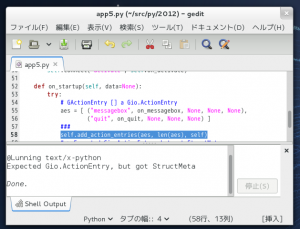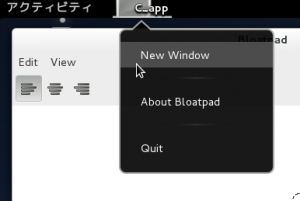プログラミング関係は次回!
と書いてから一ヶ月も放置してしまった…
とはいえ何もやっていなかったわけではなく
GNOME 3.4 リリースノート
の「アプリケーションメニュー」を PyGI でやろうと四苦八苦していた。
なんか Linux も Windows もメニューバーを無くそうと試行錯誤しているね。
そりゃまあキーボードとマウスからタッチパネルに絶賛変革中だからだろうけど。
Windows がリボンを作った時はナンジャコリャだったけど先を見ていたと今なら解る。
C のサンプルコードは公式の以下にあるのだが
GtkApplication
GtkApplicationWindow
GActionMap
GtkActionEntry はシーケンス(つまりリスト)でよかったが
GActionEntry は上手く行かなかった。
こんな感じでイケると思ったけどシーケンスでは Gio.ActionEntry ではないと例外になる。
#!/usr/bin/env python
#-*- coding:utf-8 -*-
from gi.repository import Gtk, Gio
menu_xml = """
<interface>
<menu id='app-menu'>
<section>
<item>
<attribute name='label' translatable='yes'>_MessageBox</attribute>
<attribute name='action'>app.messagebox</attribute>
<attribute name='accel'><Primary>m</attribute>
</item>
<item>
<attribute name='label' translatable='yes'>_Quit</attribute>
<attribute name='action'>app.quit</attribute>
<attribute name='accel'><Primary>q</attribute>
</item>
</section>
</menu>
</interface>"""
class Win(Gtk.ApplicationWindow):
def __init__(self, app):
Gtk.Window.__init__(self)
self.set_application(app)
self.show_all()
def on_messagebox(action, parameter, user_data):
dlg = Gtk.MessageDialog(
None,
Gtk.DialogFlags.MODAL,
Gtk.MessageType.INFO,
Gtk.ButtonsType.OK,
"text")
r = dlg.run()
dlg.destroy()
return r
def on_quit(action, parameter, user_data):
user_data.quit()
class App(Gtk.Application):
def __init__(self):
Gtk.Application.__init__(self,
application_id="apps.test.appmenu",
flags=Gio.ApplicationFlags.FLAGS_NONE)
self.connect("startup", self.on_startup)
self.connect("activate", self.on_activate)
def on_startup(self, data=None):
try:
# GActionEntry [] a Gio.ActionEntry
aes = [ ("messagebox", on_messagebox, None, None, None),
("quit", on_quit, None, None, None) ]
###
self.add_action_entries(aes, len(aes), self)
#=> Expected Gio.ActionEntry, but got StructMeta
###
builder = Gtk.Builder()
builder.add_from_string(menu_xml)
menubar = builder.get_object("app-menu")
self.set_app_menu(menubar)
except Exception, e:
print e
self.quit()
def on_activate(self, data=None):
w = Win(app)
if __name__ == "__main__":
app = App()
app.run(None)
全部 const 指定だしスタック上のデータでないと駄目なのかな?
それだとヒープ上にしか変数を作れない動的言語はお手上げになるんだけど。
海外を探しても PyGI のコードはほとんど見つからない。
現状ではみんな試行錯誤して様子見しているかブン投げているかだろうな。
はたしてこの動的バインディングは熟成して普及するのであろうか?
ええい、今回もとりあえず C 言語でコンパイルだけやってみるか。
Fedora は初期状態では gcc すら入っていない。
gcc, gtk3-devel, gtk3-devel-docs でとりあえず環境は揃う。
ついでに anjuta を導入、vala なんかもオマケで入る。
これらについては気が向いたら何か書く。
うん、C ならやはり普通にアプリケーションメニューは使える。
それなら DLL にすれば、って動的言語な意味ネェ…
C が一部でも必要ならソースコードのみで配れる C で全部作ったほうが楽。
Python と DLL では最低 x86, x86_64 用の2つを配るはめになるわけで。
ということで当面は C 言語とお付き合いになりそうです。
難しくはないんだけど、ただただ面倒くさいのが難点。

